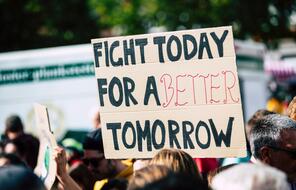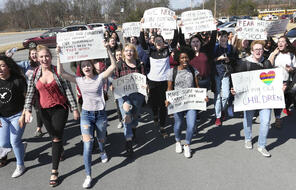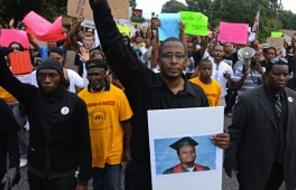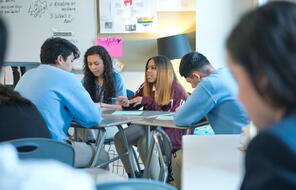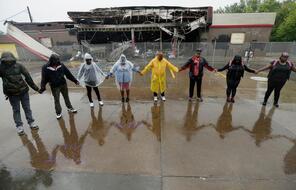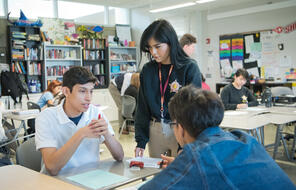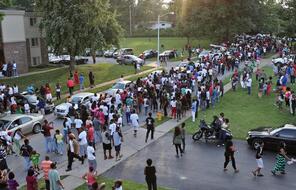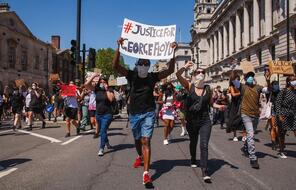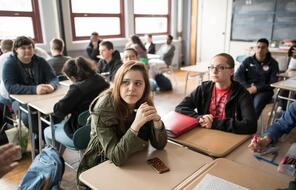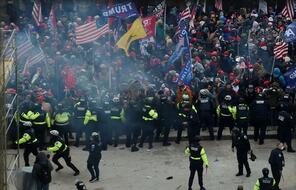South Africa's First Nonracial Democratic Election
At a Glance
Language
English — USSubject
- Civics & Citizenship
- History
- Democracy & Civic Engagement
On April 27, 1994, South Africa held its first nonracial democratic election. Approximately 19.5 million people voted, representing 87% of the electorate. People stood in lines at polling stations across South Africa. Some lines were a mile long, and some voters waited more than 12 hours to cast their vote. Mazisi Kunene, a poet and activist, was among the black South Africans voting for the first time in this momentous election. He recalls:
At first I had no intention of voting: I felt that I had already voted with my life . . . I could boast of having spent half my life in exile to demonstrate that a South African, born on this continent, had high ideals to live for . . . The whole idea of going to vote seemed to me too formal. What was needed was simply a big celebration for all South Africans, particularly those who had fought to realise a new and great South Africa. In other words I felt that I was, had been, and will continue to be a committed freedom fighter. What would a mere vote mean? For me, the very idea of democracy had been debased by those who shouted the word and were either dictators or simply inept leaders. I could be forgiven if I shouted, together with many victims, "Oh Democracy, how many crimes have been committed in your name?[”] I was puzzled by the bizarre claim that we were about to enter a paradise of democracy: all we had to do was vote for those we believed would do the job. Hadn't the various peoples of Africa chosen their representatives in the past? What was the difference between the word "vota" and "ukhetho" or "kheta"? Hadn't the dictators and tyrants traditionally been scathingly attacked by the poets and composers and eventually removed? Indeed, what was new in this democracy we were being called upon to celebrate? My thoughts turned to the urgent needs of people, particularly African mothers, living in the streets. How did these people feel as they saw their children shivering in the cold? Where were the husbands? What kind of family life can one live on the street, or in some broken-down shack? It is not Organisations, like political parties, that change things; it is organisation. Suddenly, like a flash of lightning, I realised that my act of voting was not simply physical . . . it must represent many of those people I knew who would have liked to have voted, but who died in the struggle. I had only five hours to submit my application for citizenship and to obtain my temporary voting card: I had no birth certificate or affidavit, so I was my own parent in the document I signed. I might mention that I was deeply moved by my countrymen and women (white) as they chaperoned me and my wife through all the different points. I felt a great relief and great satisfaction after my voting . . . 1
- 1Quoted in Elize S van Eeden, “The Miracle Rising as Source for Teaching History: Theoretical and Practical Considerations,” Yesterday&Today No. 12 (December 2014): 55–56.
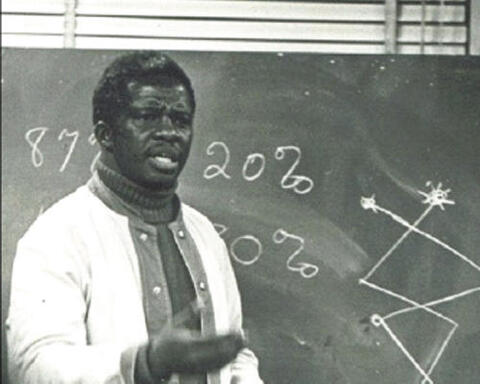
Mazisi Kunene (1930-2006), a South African poet, educator and activist, was an active supporter and organizer of the anti-apartheid movement in Europe and Africa. He later became South Africa’s poet laureate.
Connection Questions
- Mazisi Kunene writes that at first, he had no intention of voting. He felt that he had voted with his entire life. What does he mean by this?
- Why does Kunene decide that he must vote?
- What process does he go through in order to vote, and why?
- Reflect on the act or process of voting. Do you think it’s important? What role does voting play in a democracy? Make a connection to your own country. How many people voted in the last election? What percentage of the electorate voted? What would inspire more people, especially more young people, to vote?
How to Cite This Reading
Facing History & Ourselves, “South Africa's First Nonracial Democratic Election,” last updated July 31, 2018.
This reading contains text not authored by Facing History & Ourselves. See footnotes for source information.

